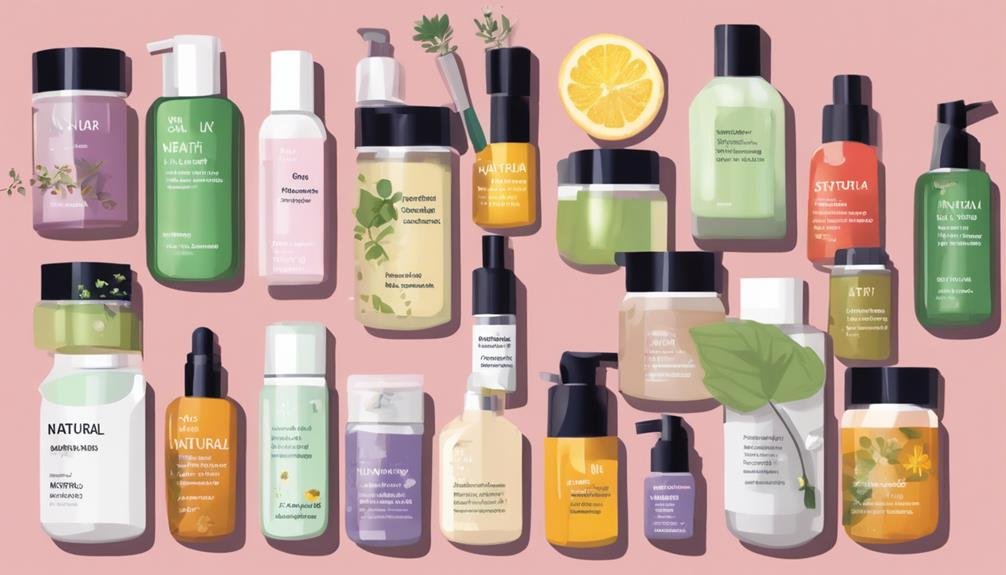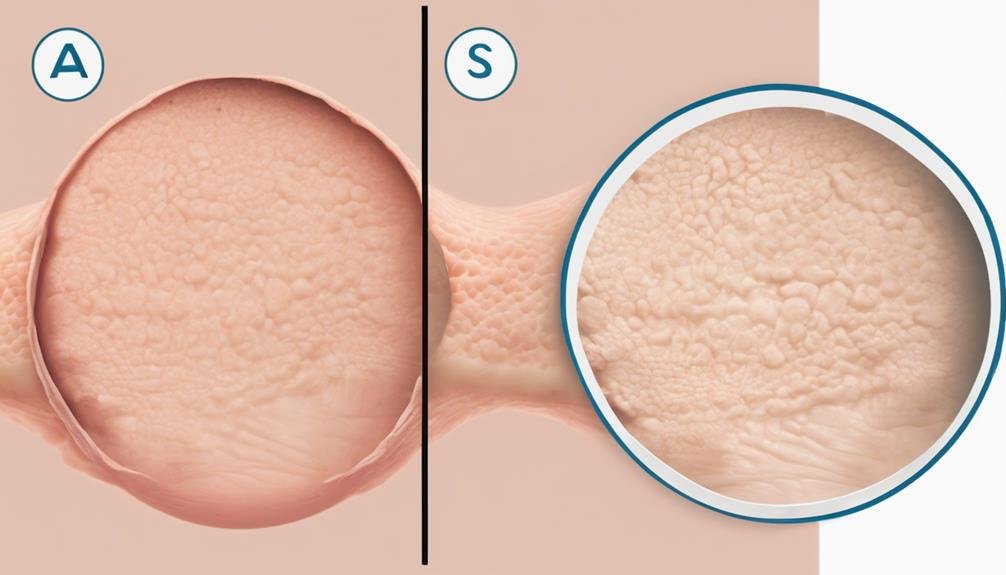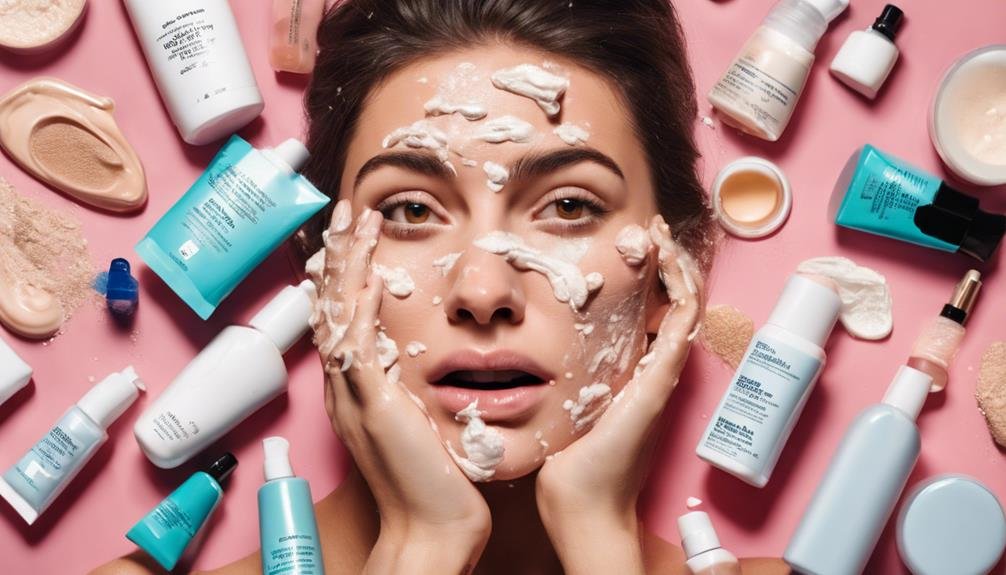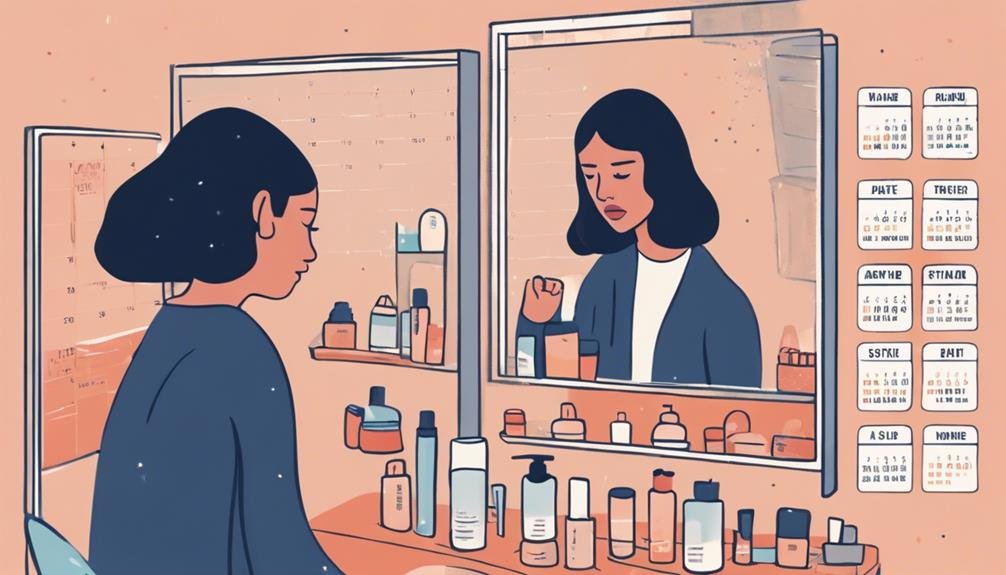You may have heard various skincare myths that could be affecting your routine without you even realizing it. From the belief that expensive products are always better to the misconception that oily skin doesn't require moisturizer, there are several misconceptions that need to be addressed. By unraveling these myths, you can make informed decisions about your skincare regimen and potentially achieve healthier skin.
Key Takeaways
- Excessive products harm skin; quality over quantity is crucial.
- Skin has limits on product absorption; more doesn't mean better results.
- Overloading skin causes irritation, clogged pores; balance product use.
- Proper nourishment from right products in correct amounts is key.
- Visible skincare results require patience, consistency for skin cell turnover.
Myth: Expensive Products Are Always Better
Contrary to popular belief, the myth that expensive skincare products are always better is a common misconception in the beauty industry. While luxurious packaging and high price tags may suggest superior quality, the effectiveness of a skincare product isn't solely determined by its cost.
Numerous studies have shown that the key to a product's efficacy lies in its formulation and active ingredients, rather than its price point. In fact, many affordable skincare brands offer products with scientifically-proven ingredients that deliver excellent results.
Research indicates that certain ingredients like retinol, hyaluronic acid, and vitamin C can effectively target various skin concerns such as fine lines, hyperpigmentation, and dehydration. These ingredients are often found in both high-end and budget-friendly products, demonstrating that quality skincare doesn't always come with a hefty price tag.
Myth: Oily Skin Doesn't Need Moisturizer
Many individuals with oily skin believe the myth that moisturizer is unnecessary for their skin type. However, this is far from the truth. Oily skin still needs hydration to maintain a healthy balance. When you skip moisturizer, your skin may overcompensate by producing even more oil, leading to clogged pores and breakouts. Opt for oil-free, non-comedogenic moisturizers that won't clog your pores. These products can help regulate oil production and keep your skin hydrated without feeling greasy.
Choosing the right moisturizer is essential for oily skin. Look for ingredients like hyaluronic acid, glycerin, or ceramides, which hydrate the skin without adding excess oil.
Moisturizers with ingredients like salicylic acid or niacinamide can also help control oil production and reduce shine.
Myth: Natural Ingredients Are Always Safe
Natural ingredients are often perceived as inherently safe in skincare products. While many natural ingredients can be beneficial for the skin, it is essential to recognize that not all natural substances are without risk. Here is a breakdown of some common natural ingredients and potential concerns associated with them:
| Natural Ingredient | Potential Concerns |
|---|---|
| Essential Oils | Irritation, sensitization, and photosensitivity issues |
| Citrus Extracts | Skin irritation and increased sensitivity to the sun |
| Witch Hazel | Can be drying and irritating for some skin types |
| Coconut Oil | Comedogenic for some individuals, leading to breakouts |
It's crucial to approach natural ingredients with caution and conduct patch tests before incorporating them into your skincare routine. Remember that natural doesn't always equate to safe, and being informed about potential risks can help you make the best choices for your skin's health and well-being.
Myth: Sunscreen Is Only Needed in Summer
There's a common misconception that sunscreen is only necessary during the summer months when the sun shines brightest. While it's true that UV rays are more intense in the summer, they can still harm your skin in the winter or on cloudy days. UV radiation can penetrate clouds and cause damage even when the sun isn't visibly shining. Sunscreen is essential year-round to protect your skin from premature aging, sunburn, and the risk of skin cancer.
Regardless of the season, wearing sunscreen daily is crucial. UV rays can still reach your skin through windows, reflecting off surfaces, and even on overcast days. To ensure optimal protection, choose a broad-spectrum sunscreen with at least SPF 30 and apply it generously to all exposed skin.
Remember to reapply every two hours, especially if you're outdoors or engaging in water activities. By making sunscreen a part of your daily skincare routine, you're safeguarding your skin against the damaging effects of UV radiation throughout the year.
Myth: Acne Is Only a Teenage Problem
Contrary to the common belief that acne is a problem exclusive to teenagers, the reality is that acne can affect individuals of all ages. Acne is a common skin condition that arises when hair follicles become clogged with oil and dead skin cells, leading to the formation of pimples, blackheads, or cysts.
While hormonal changes during adolescence often trigger acne outbreaks, other factors such as genetics, stress, diet, and skincare routines can contribute to acne development in adults as well.
Adult acne is a prevalent issue, with studies showing that around 40-55% of adults aged 20-40 experience persistent acne. Additionally, women are more likely than men to suffer from adult acne due to hormonal fluctuations related to menstrual cycles, pregnancy, or menopause.
It's essential to understand that acne isn't limited to a specific age group and seeking professional skincare advice can help in managing and treating acne effectively, regardless of your age.
Myth: Exfoliating Daily Is Necessary
Many people believe that exfoliating daily is crucial for maintaining healthy skin, but this popular notion is actually a skincare myth. Exfoliating too frequently can strip away the skin's natural oils, leading to irritation, redness, and even breakouts. It's important to find the right balance in your skincare routine to promote a healthy skin barrier.
To help you understand better, here is a table breaking down how often you should exfoliate based on your skin type:
| Skin Type | Exfoliation Frequency |
|---|---|
| Dry | 1-2 times a week |
| Oily | 3-4 times a week |
| Combination | 2-3 times a week |
| Sensitive | 1 time a week |
| Normal | 2 times a week |
Myth: Skincare Products Can Shrink Pores
Skincare products claiming to shrink pores may be a common misconception in the beauty industry. While these products often promise to minimize the appearance of pores, they can't physically change the size of your pores. Pore size is mainly determined by genetics and age, meaning that you can't permanently shrink them with skincare alone.
However, some products like retinoids and certain chemical exfoliants can help improve the appearance of pores by removing dead skin cells and debris that can make them look larger. These products work by promoting cell turnover and keeping pores clear, giving the illusion of smaller pores.
To effectively manage the appearance of pores, focus on keeping your skin clean, well-moisturized, and protected from sun damage. Additionally, incorporating gentle exfoliation into your routine can help keep pores clear and minimize their appearance. Remember that while skincare products can improve the look of pores, they can't miraculously shrink them.
Myth: DIY Skincare Is Always Safe
When considering your skincare routine, it's essential to be wary of the common belief that DIY skincare is always a safe option. While DIY skincare recipes may seem natural and appealing, they can pose risks to your skin health. Many DIY recipes found online lack proper preservation methods, which can lead to bacterial contamination and skin infections.
Ingredients like lemon juice or baking soda, often suggested in DIY recipes, can be too harsh for your skin, causing irritation, redness, or even chemical burns.
Moreover, the internet is flooded with skincare DIYs that claim to work miracles but lack scientific evidence to support their efficacy. It's crucial to remember that skincare professionals undergo extensive training to understand skin physiology and the effects of different ingredients.
Consulting a dermatologist or an esthetician before trying any DIY skincare is highly recommended to ensure that you're using safe and effective products tailored to your skin type and concerns. Prioritizing your skin's health and seeking professional advice can help you achieve a glowing complexion without compromising your skin's integrity.
Myth: More Product = Better Results
In the pursuit of flawless skin, the notion that applying more skincare products will yield better results is a common misconception. However, the truth is that using excessive amounts of products can actually do more harm than good. Your skin has its limits in terms of how much product it can absorb and benefit from.
Layering on multiple products can overwhelm your skin, leading to irritation, clogged pores, and even breakouts.
To achieve optimal results, it's essential to follow a skincare routine that's tailored to your skin type and concerns. Quality over quantity is key when it comes to skincare products. Using the right products in the right amounts will ensure that your skin receives the necessary nutrients without being overloaded.
Myth: Drinking Water Eliminates the Need for Moisturizer
To maintain healthy and hydrated skin, it's crucial to debunk the common myth that simply drinking water eliminates the need for moisturizer. While staying hydrated by drinking water is essential for overall health, the idea that it alone can fully hydrate your skin is a misconception. Skin hydration is a complex process that requires both internal hydration from water consumption and external hydration from moisturizing products.
Your skin's outermost layer, the epidermis, acts as a barrier to prevent water loss. Environmental factors, aging, and daily activities can compromise this barrier, leading to dryness and dehydration. Moisturizers help replenish and lock in moisture, improving skin elasticity and preventing water evaporation.
Studies show that moisturizers containing ingredients like hyaluronic acid, glycerin, and ceramides are effective in maintaining skin hydration. By incorporating a moisturizer into your skincare routine, you can ensure your skin remains adequately nourished and hydrated, complementing the benefits of drinking water for a healthy complexion.
Myth: Skincare Results Should Be Immediate
Skin care is a journey that requires patience and consistency. Seeing immediate results from a new skincare routine is a common misconception. Here are three reasons why instant changes shouldn't be expected:
- Skin Cell Turnover: The natural process of skin cell turnover takes about 28 days. This means that it will generally take at least this long for any new skincare products to show significant effects.
- Product Absorption: Skincare products need time to penetrate the skin and work at a cellular level. Instant results are often superficial and may not reflect the long-term benefits of consistent use.
- Skin Sensitivity: Abrupt changes in skincare routines can sometimes cause irritation or breakouts. Gradually introducing new products allows the skin to adjust without adverse reactions.
Myth: Only Women Need a Skincare Routine
Contrary to popular belief, maintaining a skincare routine isn't exclusive to women. Men's skin also requires care to look and feel its best. Men tend to have thicker skin with larger pores and more active sebaceous glands, making them prone to issues like acne and oiliness. A simple and consistent skincare routine can help address these concerns.
Regular cleansing is essential for both men and women to remove dirt, oil, and impurities that can clog pores and lead to breakouts.
Moisturizing is another crucial step to keep the skin hydrated and prevent dryness or irritation. Using sunscreen daily is vital for all genders to protect against harmful UV rays and prevent premature aging and skin damage.
Skincare routines can be tailored to individual needs, whether it's addressing specific skin concerns or simply maintaining overall skin health. By incorporating a skincare routine into your daily regimen, you can achieve healthier, clearer, and more radiant skin, regardless of gender.
Frequently Asked Questions
Can Oily Skin Benefit From Using a Moisturizer?
Yes, oily skin can benefit from moisturizer. Look for oil-free, non-comedogenic formulas. Moisturizers help balance oil production, prevent dehydration, and maintain skin barrier function. Choose lightweight options to avoid feeling greasy. Consistent hydration is key.
Are Natural Skincare Ingredients Always Safe for the Skin?
Yes, natural skincare ingredients are not always safe for your skin. While many are beneficial, some can cause irritation or allergic reactions. It's important to research and patch test new ingredients to ensure compatibility with your skin.
Do Skincare Products Actually Shrink Pores?
Ever wondered if skincare products truly shrink pores? Well, some can help temporarily minimize their appearance by keeping them clean and unclogged. Look for products with salicylic acid or retinoids for effective pore refinement.
Is Daily Exfoliation Necessary for Healthy Skin?
Daily exfoliation isn't necessary for healthy skin. Over-exfoliation can strip away natural oils, leading to irritation and sensitivity. Opt for gentle exfoliation 2-3 times a week to remove dead skin cells and promote skin renewal.
Do Men Need a Skincare Routine as Well?
Yes, men need a skincare routine too. Daily cleansing, moisturizing, and sun protection are essential. Neglecting your skin can lead to premature aging and skin issues. Treat your skin with care, it's not just for women.
Conclusion
In conclusion, debunking common skincare myths allows for a more effective and beneficial routine. Remember, quality over quantity is key when it comes to skincare products. Don't fall for the misconception that expensive products are always better or that oily skin doesn't need moisturizer. By understanding the truth behind these myths, you can achieve healthier, glowing skin. So, next time you hear a skincare myth, take it with a grain of salt and stick to what truly works for you. After all, beauty is skin deep.







